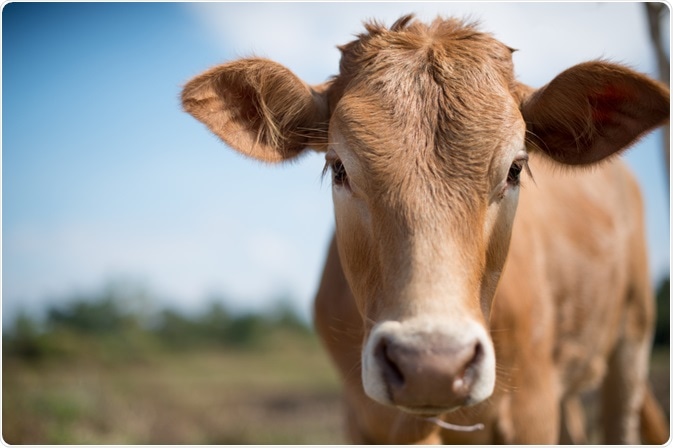There is a lot of controversy surrounding the use of rBGH in food, as many consumers have concerns about the possible adverse health effects that may arise from consuming food treated with recombinant bovine growth hormones, such as milk or meat. This article aims to examine the sources of rBGH and the safety of animal products.
 Kraipet Sritong | Shutterstock
Kraipet Sritong | Shutterstock
Synthetic versions of rBGH are identical to their natural counterparts and as such, it is impossible to tell if rBGH, whether it is in meat or dairy products, has come from natural or synthetic origins. The composition of milk does not change if it is treated with rBGH.
What are recombinant bovine growth hormones?
Recombinant bovine growth hormones (rBGH), also known as recombinant bovine somatotropins (rBST), are synthetic versions of the naturally occurring peptide hormone made by a cow’s pituitary glands. It is important to note that rBGH or rBST is a protein hormone and not a steroid hormone, unlike the sex hormones.
rBGH is produced in small quantities and its role is to regulate metabolic processes. When a calf is young, rBGH acts as a growth hormone. During lactation, it encourages the mother’s body to use fat for energy and uses energy gained from feed in milk production instead of in tissue synthesis.
Milk in the human diet
Milk is the main source of calcium in the Western diet, and is also a source of phosphorus, protein, magnesium, riboflavin and vitamin B-12, among others. Calcium, phosphorus and vitamin D are essential in bone development and maintenance, and as such are important dietary elements throughout a human’s life.
The effects of recombinant bovine growth hormone on humans
Bovine and human milk are similar in nutritional value, although bovine milk is higher in protein and lower in carbohydrate. The hormone, growth factor and hormone-like peptide content are thought to be similar in both bovine and human milk.
There are too few similarities between bovine and human growth hormones for the introduction of rBGH into humans (to treat diseases, for instance) to have any adverse effects. In one study, high doses of rBGH were administered to children with hypopituitary dwarfism. This had no effect whatsoever on the children.
Additionally, around 90% of rBGH is destroyed during pasteurization (where milk undergoes heat treatment to eliminate pathogens), so no effects can be attributed to the ingestion of rBGH via milk or cheese. The majority of the milk in the USA is pasteurized, and cooking meat destroys bovine somatotropin.
The nutritional quality of milk or meat from cows treated with rBGH is believed to be the same to that of untreated cows. However, the milk from cows treated with rBGH contains more insulin-like growth factor 1 (IGF-1) than untreated cows. The implications of this are currently unknown.
Children already consume IGF-1 through both cow’s milk and mother’s milk, and the effects of increased consumption of IGF-1 haven’t been confirmed. Some connections have been made between the consumption of IGF-1 and an increased risk of cancer of the colon, pancreas, endometrium, breast and prostate.
What are the effects of treating cattle with rBGH?
rBGH increases the overall efficiency of the milk production process, with the possibility of increasing milk production by 10-15 percent per cow. However, increased milk production may be accompanied by higher incidence rates of mastitis, an inflammatory condition involving the mammary gland and udder tissue that is the most costly disease affecting the dairy industry.
Controversies around recombinant bovine growth hormone
It isn’t only consumers that are concerned about the use of rBGH in food. Some players in the dairy industry are concerned about rising competition as the use of rBGH can increase milk production. This practice has financial implications and makes rBGH treatment appear to be an attractive option to improve or sustain business.
Summary: Is rBGH safe?
rBGH has no discernible effect on humans when consumed through either milk or meat products. Most, if not all, of the rBGH is destroyed during pasteurization and cooking processes, and the nutritional values and flavour of food from treated cattle is thought to be identical to its untreated counterparts.
Treating cattle with rBGH can increase milk production and therefore improve business, which is a point of controversy regarding financial competition and from an animal welfare perspective, as there is a higher chance of a cow suffering from mastitis from increased milk production.
More tests need to be done to confirm that consuming rBGH treated food has no effect on humans, but current research suggests that this is the case.
Further Reading
Last Updated: Jan 16, 2019